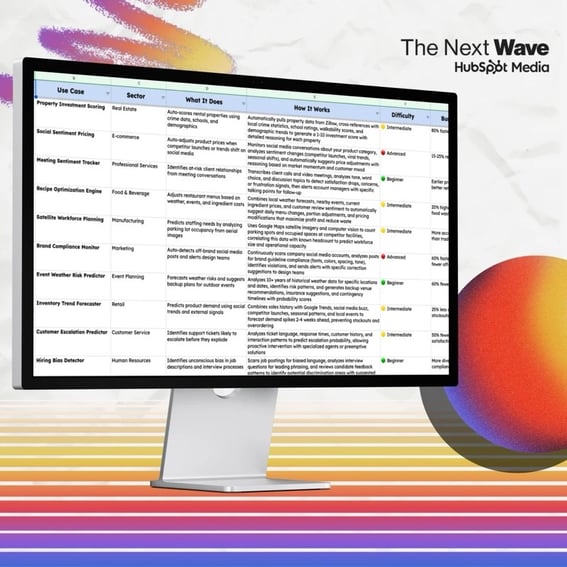Introduction
This is part 3 in our AI in GTM Startup Strategy Report series where we surveyed startup founders, executives, and investors from six countries. In part 1, we reported on key usage and adoption benchmarks. In part 2, we examined various AI tool categories, their impact on different business aspects, and the returns on investment across all respondents.
Now, in our final installment, we explore how AI is reshaping the investment landscape and what lies ahead for startups. From investor perspectives on AI-powered companies to emerging GTM capabilities and predictions for 2026 and beyond, this report reveals how leading startups are building their AI-first strategies—and what your startup needs to know to stay competitive in this rapidly evolving ecosystem.
AI investment and funding success
Today’s investors are more judicious about where to invest, and startups are turning to AI to stay competitive.
How venture-backed startups are ramping up AI usage
65% of founders have increased their investment in AI this past year. This number is largely consistent across funding rounds and ARR: 65% of Series A and B startups, 67% of Series C and D startups, 76% of startups with $1M to $5M ARR, 66% of startups with $5M to $20M ARR, and 72% of startups with over $20MM ARR have all moderately or significantly increased their investment in AI this year.
The takeaway? Regardless of maturity or size, an increasing number of startups are discovering valuable ways to leverage AI to enhance their GTM tech stacks. Companies that run better grow better, and tools that streamline processes are a necessity in 2025.
Here are the latest investor insights from HubSpot for Startups’ AI Summit:
- “If startups aren’t using AI tools or agents, we’re less inclined to invest.”
Adina Tecklu, Partner, Khosla Ventures - “With AI, you see companies scaling to $60M in ARR with 30 employees. The revenue per headcount is very high. If you can keep teams very lean, you have a better shot of being nimble.”
Cathy Gao, Partner, Sapphire Ventures - “As a VC, you have two entrepreneur types. One is the repeat founder. Then, there’s the first-time founder, who hasn’t experienced the ups and downs of the startup world. Today, not having done things a certain way and having a learning-first mindset, is valuable. Anyone can really do it. It’s democratized startups to a degree that’s never existed before. It’s very confusing for VCs.”
Priya Saiprasad, Co-founder and GP, Touring Capital - “Last year at Sapphire, we did roughly thirteen net new deals. The vast majority of those deals were application companies versus infra companies or dev tool companies. Personally, I believe there’s going to be a lot of value to the application layer, just like we saw with the cloud wave. We believe that’s the area where companies can actually differentiate, and tap into specific industry-focused datasets.”
Cathy Gao, Partner, Sapphire Ventures - “The world is moving towards vertical software and domain-specific software in an industry where there’s a deep pain point. It’s an ROI you’re delivering in a particularly meaningful way to a particular buyer. And now, incumbents like Microsoft are teaming up with startups like OpenAI. So, you’ve got distribution and scale, combined with the innovation and speed of a startup. In a world like that, where do you find pockets of opportunity? It’s not the tech moat that helps you win, it’s the network effects, the data moat.”
Priya Saiprasad, Co-founder and GP, Touring Capital - “As investors, even at the growth stage, where we've historically had more data, more metrics to underwrite investment, now we're even more focused on underwriting the team, the founder, knowing that if things change and no one can predict the future. Unfortunately, we don't have crystal balls. I wish we did. Is that founding team gonna be able to effectively pivot? The ability to learn and be agile is itself is the differentiating factor.”
Cathy Gao, Partner, Sapphire Ventures
AI and fundraising takeaways for startups
|
The future of AI in startup GTM
AI has already come a long way, but its future is even more promising, and moving faster than most professionals can keep up. Here’s where the industry is heading.
Emerging AI capabilities for GTM
AI will continue to streamline manual, time-consuming processes.
Predictive analytics and lead scoring tops the list of AI priorities for startups that dedicate over 50% of their GTM tech stack to AI (28%) and startups under 10 employees (22%), while competitive intelligence and market research capabilities are most important to startups with ARR between $5M and $20M (31%) and series C or D startups (25%).
AI talent and skill development
In 2024, 66% of respondents planned to hire employees with AI expertise in 2025, and another 80% felt that AI would play a role in their expansion. This hiring is now in full swing: 93% of founders we surveyed plan to hire for AI-specific skills or expertise in the next year.
HubSpot is transforming into an AI-first company. We’ve created an internal governance framework for AI use, invested in formal Claude training, and use AI to complement many existing processes. This year, we hosted our first 2-day long GrowDAI, an internal AI upskilling event. CMO Kipp Bodnar and marketing SVP Kieran Flanagan shared how they use custom GPTs in their day-to-day, using different templates and formulas to provide feedback and streamline marketing team workflows.
We’ve also infused AI throughout our GTM. Our AI SupportBot handles over 35% of support tickets while maintaining high customer satisfaction, and our AI SalesBot resolves over 80% of website chat inquiries. We’re transforming sales prospecting with AI-powered and automated communications, generating over 10,000 meetings for our sales teams in Q4 alone. AI is helping us work smarter, serve customers better, and lead by example. With smarter processes and tools, our GTM managers can focus on longer-term initiatives by giving them more time, and the ability to apply more brain power to longer-term initiatives.

Predictions for 2026 and beyond
Customer expectations will continue to rise as AI becomes ubiquitous. Just a few months ago, the bar for quality was “accurate outputs.” Now, customers expect AI to deliver intelligent, nuanced, and genuinely insightful answers. Capabilities like memory, reasoning, and prediction are becoming more important, and we're seeing OpenAI upgrade ChatGPT’s “memory” and Microsoft add “deep reasoning” for Copilot. And sooner rather than later, every go-to-market employee will have an AI assistant.

AI models will also become more sector- and domain-targeted to meet more specific needs with lower computational needs. AI tools that understand specific business context (data, terminology, processes) provide exceptionally more value than general-purpose models.
“There is no AI without data. Data is so critical to building AI systems and driving differentiation, but in the enterprise sector, there is data everywhere. In fact, there’s a lot we may not consider data that’s really valuable, like unstructured information. What is really important is that you don’t look at data sources as silos, but really as a connective tissue to bring it all together. When you’re able to connect the dots across these systems, you’re able to spot patterns that wouldn’t be possible in a siloed way. It enables more intelligence,” says Francois Ajenstat, Chief Product Officer at Amplitude.
As AI gets more sophisticated, models will be able to capture and analyze knowledge previously hidden in unstructured sources. These include customer questions or objections in sales calls, emails, or chat interactions that can be used to refine marketing messages.
Building your AI-powered GTM strategy
AI is making new levels of intelligence and scale available to startup founders everywhere. This is a disruptive shift that’s making it far easier for startups to compete in spaces that previously required deep machine learning talent and expensive computational capacity.
What’s in the AI roadmap for scaling startups?
- Perform a comprehensive audit of your current GTM processes to identify high-value AI implementation opportunities
- Develop a phased implementation plan that prioritizes high-ROI use cases first
- Create an AI skills development plan for existing team members
- Consider hiring specialized AI expertise based on your growth stage
In today’s market, the most curious leaders are the ones who will win. An AI-first mindset means seeing AI as an opportunity, not a threat, and using AI to reimagine work, not just automate tasks. AI is already powering a whole new way of thinking about growth, and it will only get more powerful over time.
Methodology
HubSpot for Startups conducted a survey in April 2025 in collaboration with Datalily with a total of 500 startup founders and professionals across the United States, United Kingdom, France, Germany, Singapore, and India at startups with Seed through Series D funding across industries to gain these data points.
Special Offers

Free Database
100+ Creative AI Use Cases Beyond Cold Outreach
This database reveals 100+ unconventional AI use cases across 30+ industries, from real estate investment scoring to event weather risk assessment, that solve real problems unexpectedly. Break out of the generic AI uses and leverage AI to make you stand out amongst the rest!
You'll get:
- 100+ Creative Use Cases: Spanning Real Estate, Healthcare, Manufacturing, E-commerce, and 25+ other industries.
- Implementation Guidance: Difficulty levels, required tools, business impact metrics, and getting started steps
- Competitive Advantage Focus: Applications your competitors haven't discovered yet
Go Beyond the Obvious
The companies dominating the next decade won't be using AI for obvious tasks; they'll discover creative applications that give them unfair advantages. Your breakthrough might be hiding in this database. Whether you want to streamline operations, uncover revenue streams, or solve persistent challenges, these 100+ use cases will help you think beyond the conventional AI playbook.
Use AI to stand out from the crowd. Access now and start building your competitive edge today.

